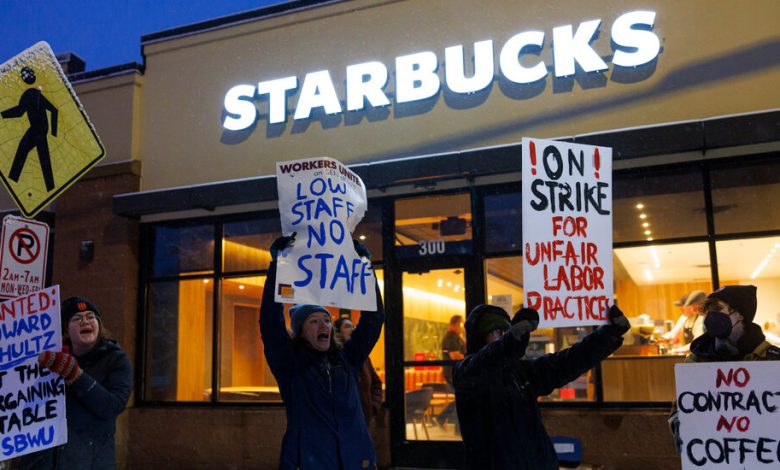Starbucks Union Strikes at Dozens of Stores as Talks Stall

The union organizing Starbucks workers declared a strike at dozens of stores on Friday, the latest escalation in its campaign to secure a labor contract.
The strike is intended to last for three days at many of the stores, according to Workers United, the union representing the workers. It follows a one-day strike at roughly 100 stores last month.
Workers involved in the strike say they are protesting the company’s slow pace of bargaining and its recent closing of unionized stores, including one near Broadway and Denny Way in Seattle. They also complain about understaffing and cuts to their hours.
“Starbucks sent a clear message when they closed the Broadway and Denny store,” Michelle Eisen, a Buffalo-based barista who has been a leader of the union campaign, said in a statement. “They’re doubling down on their union-busting, so we’re doubling down, too. We’re demanding fair staffing, an end to store closures, and that Starbucks bargain with us in good faith.”
Several Starbucks workers at a store in Chicago stood outside in snowy conditions holding picket signs, but the store remained open, and a manager said he was preparing orders for pickup.
The union, which represents workers at more than 250 of the roughly 9,000 company-owned stores in the United States, said Starbucks representatives had walked out of dozens of bargaining sessions this fall after shortly after they began, preventing progress on a contract.
The company said it closed the Seattle store along with more than 35 others nationwide since July, typically because of security concerns, including about 10 unionized stores.
It said that its negotiators had walked out of bargaining sessions because union representatives sought to broadcast the sessions to co-workers outside the room using video-chat software, potentially inhibiting the discussions, but that negotiators had “come to the table time after time prepared to bargain in good faith.”
The union won its first vote at a store in Buffalo last December, and the campaign spread quickly across the country during the first half of this year.
But organizing has slowed in recent months, with filings for union elections dropping from about 70 in March to fewer than 10 in August.
Workers United has argued that Starbucks impeded the organizing campaign by firing dozens of union supporters and excluding unionized stores from recent wage increases and new benefits.
The federal labor board has issued numerous complaints over these accusations, and judges at the agency have ruled against the company in some cases. The company has appealed at least one of the rulings.
Starbucks has said that the firings reflect violations of company policies and that it is legally prohibited from granting new benefits and wage increases at unionized stores without bargaining over them first.
